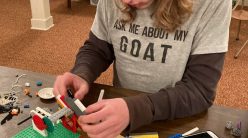
Here’s a fun way to get the kids writing and encourage creativity at the same time.
This month’s worth of creative writing exercises will help kids of all ages and abilities to create their own poems. New poets can use the ideas to get a feeling for all of the ways to write poems and all of the things they can be about, while seasoned poets can use the assignments to get past writer’s block or just go in some new directions.
Remind the kids that the only rule of poetry is that there are no rules. Poems don’t have to rhyme. You don’t have to use proper capitalization or punctuation. You can break sentences in the middle of the line (and it’s often a good thing!).
In the spirit of no rules, let the kids know that they’re free to substitute their own assignments or change them up on any day, too!
30 Days of Poetry Assignments
- Write a poem where every line starts with the same letter.
- Write a poem from the point of view of a plant.
- Write a poem that uses a great deal of alliteration (here’s a refresher what alliteration means).
- Write a poem to yourself.
- Write a poem that starts with the first three words of a song lyric that you like. End it with three more words from the lyrics.
- Create a found poem. Here’s a refresher of what found poetry is. Experiment a lot with where you break the lines and end the poem in order to make the biggest impact.
- Write a poem with lines that all have odd numbers of words, and no repeat of numbers (for instance, lines could be 7, 5, 9, 13 and 1 word long).
- Write a poem about a historic figure.
- Write a poem that retells a fairy tale theme in a new way (for instance, from the perspective of the wicked witch, or with Snow White choosing a different ending).
- Write a twitter poem — it must be 140 characters or less.
- Take an old poem of your own and replace at least 50% of the words with new words (they can be synonyms, antonyms or any words at all). See which version you prefer. Then write the poem again with whichever words you prefer.
- Do the same exercise with a classic nursery rhyme.
- Write a poem that is exactly 16 lines long and starts with the word sometimes.
- Write a haiku about summer. (Remember, a haiku is generally 5-7-5 syllables long.)
- Open up a book and put your finger on a random word. Do it 9 more times. Write down those 10 words and use them in a poem.
- Write a poem that includes the words other, mother, smother and/or cover at least 10 times (any of the words or all). Feel free to add other words and phrases that sound similar (such as brother and of her).
- Write a poem as an elderly version of yourself looking back on these years.
- Write a poem that starts with the word and.
- Find a photograph that you like (that you took or found) and write a poem to accompany it.
- Write FOREVER down a sheet of paper. Write a poem with each line starting with the corresponding letter.
- Pick one of the 24 poets every child should know and read at least 5 poems by her/him, then write a poem about a subject in one of the poems while the poet’s voice is still fresh in your mind.
- Write a gravestone poem — a poem about someone who has died (made up, real, historical, anyone) that would fit on a gravestone and sum up that person in just a few short lines.
- Write a poem about an aspect of yourself that is made up for the poem (for instance, what it’s like to be an immigrant or the time you saved the world).
- Write a dice poem. Get out one or two dice and roll to see how many words each line should be. If you like, roll to find out how many lines long it should be, too.
- Think of a popular ad slogan and work that into a poem. Try to use the phrase in a totally different way (for instance, making “good to the last drop” be about tears).
- Write a poem about a childhood memory.
- Set a timer for 3 minutes and write a random poem about anything that comes to mind nonstop with your non-dominant hand (for instance, your left hand if you are right handed). When the timer goes off, recopy it with your dominant hand and add three lines anywhere in the poem.
- Write a poem about a dream you’ve had.
- Write a poem that incorporates at least three senses (for instance, what you can hear, see or taste).
- Write a poem about yourself in the third person (as if you were writing about someone else).
If you want to do more with poetry, I have my 10 week poetry for kids course (free) online here.
Have fun!
***
Want to support our site?
Treat yourself to something on Amazon!
You deserve it, and it will help us out.
It’s a win-win! 😉
This site is an affiliate for Amazon.com. Purchases made through this link will earn us a small commission at no extra charge to you.
***
This article originally appeared on examiner.com




